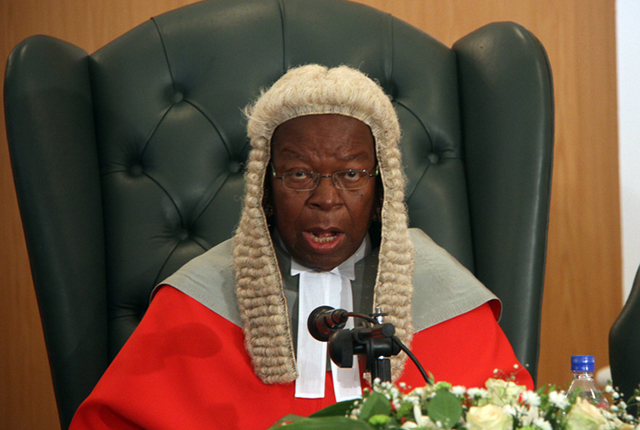When ideology meets justice

Nick Mangwana View From the Diaspora—
Zimbabwe’S Constitution is going to get its first amendment and, boy, has this caused a lot of concern. Some are worried that a Constitution that took 33 years of Independence to be made, as well as four years of consultations to come about could be amended so easily or so early. They argue how the document can be amended before we have fully aligned laws to it or even implemented it fully.
All these concerns are legitimat but, on the other hand, some contend that no matter how long a house takes to build, if there is a structural deficiency it has to be remedied as soon as it has been noted.
In this case it is about the process to choose a Chief Justice (CJ) in light of the incumbent’s impending retirement in a couple of months’ time. At the heart of the need to amend the process ascribed by S180 of the Constitution is that the Judicial Service Commission (JSC) has a conflict of interest, making the process defective.
Examples cited are that Deputy Chief Justice Malaba is a member of the JSC but is also a contender for the post of CJ. Another candidate, Justice Rita Makarau, has the same challenge. She is a member of JSC, in fact she is the Secretary to it but she has to be interviewed by the same body.
The same applies to this Justice Chiweshe who is also the Judge President. S189 of the Constitution took care of that. These are very senior judges. They, of course, had to recuse themselves from the panel and be replaced by some juniors. This is where some argue that it is anomalous for a junior to interview their senior.
Surely, this does look defective. So the case for an amendment looks clear enough. But amendment to what? There is a tendency to benchmark democratic processes with those of the United States as it IS touted as the leader of the Free World. Let us for once succumb to the temptation to refer to their process in choosing the Supreme Court Judge.
In the United States of America, the nomination of a Supreme Court judge is considered a significant political event. Unlike in Zimbabwe, in the United States such appointments are lifetime. The appointment power is shared between the president and the Senate.
The president nominates, the Senate confirms. From 1759 to 2010, 123 out of 159 nominations, 77 percent, were confirmed. In more than a hundred years, only four nominees were rejected by the Senate and 55 were accepted. That is a success rate of 93 percent.
The rejected ones were John J. Parker (1930), Clement Haynsworth (196), Harold Carswell (1970) and Robert Bork in 1987. It means for all intents and purpose the President of the United States appoints the Supreme Court judges including the CJ.
You cannot take politics out of this whole process because a Chief Justice is chosen on the basis of their ideological slant. Are they conservative or are they liberal? What is their ideological bent on, say, abortion issues? Where do they fit on the religious spectrum? In short, what is their politics?
If the president’s party holds the majority in the Senate then confirmation is always likely to happen unless the nominee is really not qualified. Once the qualification of someone is established then it is about the ideological position of someone being in step with that of the president and Senate.
Appointment after nomination is almost a fait accompli. It is important to emphasise at this point that these selections are lifetime positions. This means if power changes these judges only change through death or retirement.
So those who argue that the process taking place is political are right. There is the governance issue in that the current constitutional provisions make the process irregular but trying to take politics out of a position like CJ is being naïve and Utopian.
The Chief Justice plays a pivotal role in policy making and policy. This is why presidents around the world look for Chief Justices whose views are symmetrical to those of the regime. This is also why the Chief Justice of Rhodesia, Hector MacDonald, joined the Lancaster House negotiations as a constitutional advisor to the Muzorewa/Smith delegation.
But is there a contradiction in the doctrine of separation of powers in this argument? Not at all. The concept of separation of powers is not a concept of dissonance or discord. There is a separation of power between the Executive and the Legislature and yet Cabinet is chosen from the legislative arm of a ruling party. It means in theory members of the Cabinet and those of the dominating party share a common policy thrust. And yet one acts as a countervail on the other.
In the case of Zanu-PF, a good number of MPs are also Central Committee members. The Central Committee is the highest policy making body of the party between Congress. It means that the policies implemented by the Executive are the policies made by the same MP who then puts on a different jacket in the Legislative Assembly to play an oversight role.
There is nothing incestuous about such an arrangement and it’s not contrary to the doctrine of separation of powers. It is the same with the MDC-T. If it was to get Executive power the same scenario would still obtain.
Why then would we expect a Chief Justice who is a professional judicial officer not expected to be objective and professional when it comes to their job? The role of the Judiciary is not to undermine Government policy. It is there to act as a check on excesses. So having the same ideological slant is a very unlikely factor in acting as a check on those excesses.
This column has the same ideological underpinnings with the ruling party but it always critical of excesses. So what’s the big deal here? Wasn’t Chief Justice Enoch Dumbutshena chosen by President Mugabe? How many judgments did the establishment lose when it was dragged before him? Yet during the liberation war he was also a nationalist, wasn’t he?
The Government of Zimbabwe has lost a lot of cases before the Judiciary during the era of any of the three Chief Justices Zimbabwe has had in Dumbutshena, Gubbay and the incumbent Chidyausiku. The reader should remember that all these were chosen by President Mugabe.
For a long time, Justice Hungwe was a favourite of the opposition. It is only in the Zibani case that he is starting to receive brickbats from the opposition and civic society. Justice Rita Makarau is one of the favourites of some people in the opposition. How does that work that they demonise her in ZEC and laud her judicial impartiality that they really would like her at the helm of the Judiciary? People should just make their minds whether they believe someone is fair minded or not.
The argument here is that, surely the choice of Chief Justice is a big deal but it might have very little impact on the judgments the Judiciary he/she presides over arrives at. It has a lot more impact on policy. Let us not also forget that the Constitutional Court is comprised of nine judges and unless somebody is missing something, all of them have one vote each. That is including the Chief Justice.
The Chief Justice does not serve at the pleasure of the President. From the moment he is sworn the person who has sworn him in loses control. That umbilical cord is broken unless someone has a misplaced sense of loyalty. But power doesn’t work that way. If someone is given power, it normally becomes theirs and not that of the giver. This is why the President loses a lot of cases before the same judges he selected.
Weight has to be given to the argument that it is not about judgments but about principles. That argument cannot be dismissed or minimised. For this columnist the question is not whether the S180 should be amended or not. The case of the amendment is quite clear. The question is to what? To the President being the appointing authority?
Or to a panel of retired or foreign judges being the appointing authority or Parliament over the appointment through one of its committees just like when it picks commissions. This is where the argument should lie not whether the status quo ante should be maintained or not. The current scenario is incompatible with any modern governance principle.
The Judiciary is a branch of Government. It should remain independent to act as a check on the Government. But it doesn’t have to be in perpetual conflict with the Government of which it is an institution.
The impartiality and power of a professional judicial officer flow from the Constitution. Not from the appointer. The Judiciary is the bedrock upon which the rule of law is built. It should not be discoloured by the politics of the day as judges normally outlive govern- ments.









Comments